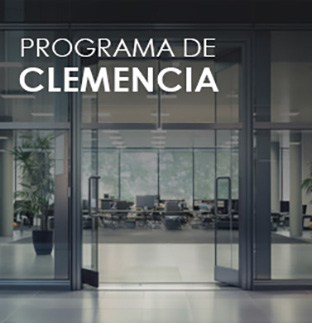-
Somos CNMC
Somos CNMC
La CNMC promueve y defiende el buen funcionamiento de todos los mercados en interés de los consumidores y de las empresas.
Actividad internacional -
Vigilamos la competencia
Vigilamos la competencia
Observamos y analizamos la actividad del mercado para detectar y prevenir prácticas anticompetitivas que puedan dañar la competencia y afectar a los consumidores.
Programa de clemenciaColabora con la detección de cárteles o avanzar en la investigación de los ya detectados
-
Sectores que regulamos
Sectores que regulamos
Establecemos normas para garantizar una competencia efectiva entre empresas de distintos sectores económicos, con especial atención a la protección del consumidor.
Test velocidad conexión -
Impulsamos la competencia
Impulsamos la competencia
Ofrecemos asesoramiento y apoyo para ayudar a mantener el equilibrio en el mercado al crear la normativa o redactar pliegos públicos.
-
Fácil para ti
Fácil para ti
Nos esforzamos para conseguir que las empresas jueguen limpio e imponemos sanciones a las que se salten las reglas.
Te damos las herramientas para que puedas elegir mejor, y canales para informar si ves alguna mala práctica.
Participa en las consultas públicas abiertas
Ahorra en tu facturaEl comparador de ofertas de energía te permite consultar las ofertas de gas natural y las ofertas de electricidad
-
Prensa
Prensa
Si no quieres perderte nada, síguenos o suscríbete a nuestros contenidos.
CNMCblog -
Participa
Participa
Comparte tus ideas y colabora con nosotros.
Consultas públicas
Listen
CNMC public consultation on public passenger transport services by railroad
(open from October 30th, 2024 to December 13th, 2024)
Why is the CNMC conducting a public consultation on public passenger rail transport services?
Passenger rail transport is crucial for the economy and for the welfare of citizens, as it is more sustainable and safer than other means of transport and is widely used. According to data from the Spanish Statistical Office (INE), in 2023 it totaled 533.6 million passengers in Spain, transported through a network of 15,615 km and nearly 11,000 trains per day, with most of the routes being suburban and mid-distance.
The sector is in the midst of a major transformation. Following the opening of freight transport to competition in 2005, high-speed and long-distance passenger transport began to open up in December 2020, with a very positive impact (see Report on the liberalization of passenger rail transport (INF/DTSP/031/2024). The next milestone is the introduction of competition in passenger transport subject to public service obligations (PSO), which in Spain corresponds to suburban and mid-distance services. The CNMC has already begun to examine the challenges accompanying this opening and to make recommendations to address them, most recently in the report IPN/CNMC/014/24 on the Draft Order on the regime of authorizations to provide passenger rail transport services subject to public service obligations.
Given its relevance for the economic, social and ecological transition, and considering the challenges it faces, the CNMC has initiated a study on passenger rail transport services subject to public service obligations (see press release). The objective would be to identify the challenges of opening these services to competition and make recommendations to address them and guarantee the best outcome for the benefit of citizens.
As a starting point for this study, the CNMC is launching this public consultation.
What is the public consultation for?
The public consultation aims to reach the largest number of agents involved in this field to gather their views on public passenger rail transport services and their upcoming tendering. It also responds to the objective that the CNMC studies are supported by public consultations to encourage the participation of society in its development, as contemplated in the CNMC’s Strategic Plan 2021 - 2026.
The responses provided will be analyzed to identify possible areas for improvement. These will be incorporated into the study and may lead to recommendations to promote competition and efficiency in public passenger rail transport services.
Rules for participation in this public consultation
This public consultation follows a transparent process and the contributions received will be taken into consideration for drafting the study. The contact e-mail address of the participants in the consultation will remain confidential and will not be published under any circumstances. The full name of the individual or institution responsible for the contribution may be kept confidential if expressly requested. However, the answers may be published in their entirety, unless there are duly justified confidentiality reasons.
Only the fields marked with an asterisk (*) are mandatory. Answering the rest of the questions of the consultation is not mandatory, so participants are encouraged to focus their contributions on those sections where they hold relevant information, leaving questions where no information or judgment is available unanswered or marked as DK/DA (“don't know/ don't answer”).
Answers to open-ended questions are provided with a maximum character length in order to ensure a concise response. Participants are encouraged to include references or links to publicly available documentation to reduce the extension of the contribution as much as possible. If a participant wishes to submit additional information, an electronic file (pdf, excel, word, etc.) may be sent to the e-mail address dp.estudios@cnmc.es with the subject line “Study on Passenger Rail PSO”. Again, this documentation may be published in its entirety, unless otherwise requested for duly justified confidentiality reasons.
Download public consultation form in PDF formatAccess the public consultationAcceso a la consulta pública






